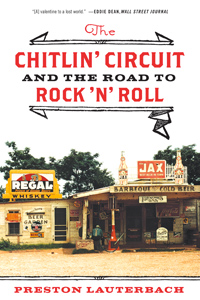Check out the evolution of black music in Houston through colorful ads and photographs that appeared in the Houston Informer. All of the action depicted here went down thanks to the misunderstood Don Robey, a figure who’s been depicted as a brute, probably not altogether unfairly, but who was also an ingenious black music businessman when such a thing had scarcely existed. He is, I believe, the key business figure in promoting the growth of rhythm-and-blues-rock ‘n’ roll down South during and after WWII.
After launching Louis Jordan’s first big tour in summer 1942, Robey promoted a succession of loud and lascivious small abnds through the South, such as this one in December 1945:
 In early 1946, Robey opened a nightclub more posh than any previously seen on the bayou, The Bronze Peacock. It became a key chitlin’ circuit hub, site of key business transactions and late night jam sessions where youngsters like Amos Milburn learned from veterans like Joe Turner. A New Orleans trumpeter and bandleader named Dave Bartholomew met an LA record man named Lew Chudd there in 1947, leading to the phenomenal career of Fats Domino. Opening night set a wild, eclectic tone for the club:
In early 1946, Robey opened a nightclub more posh than any previously seen on the bayou, The Bronze Peacock. It became a key chitlin’ circuit hub, site of key business transactions and late night jam sessions where youngsters like Amos Milburn learned from veterans like Joe Turner. A New Orleans trumpeter and bandleader named Dave Bartholomew met an LA record man named Lew Chudd there in 1947, leading to the phenomenal career of Fats Domino. Opening night set a wild, eclectic tone for the club:
The Peacock was also the site of a legendary debut: Gatemouth Brown hit so hard, Robey rushed him to the top of the bill before learning how to spell his name.
Gatemouth Brown hit so hard, Robey rushed him to the top of the bill before learning how to spell his name.
Finally, a reformed drag queen from Macon, Georgia known as Little Richard played a Houston residency in early 1953 as a member of the outlandish Tempo Toppers. The quartet played everything from banjo to bongos, and danced their hearts out, one with a table clenched in his teeth. That’s Richard, third from left:




